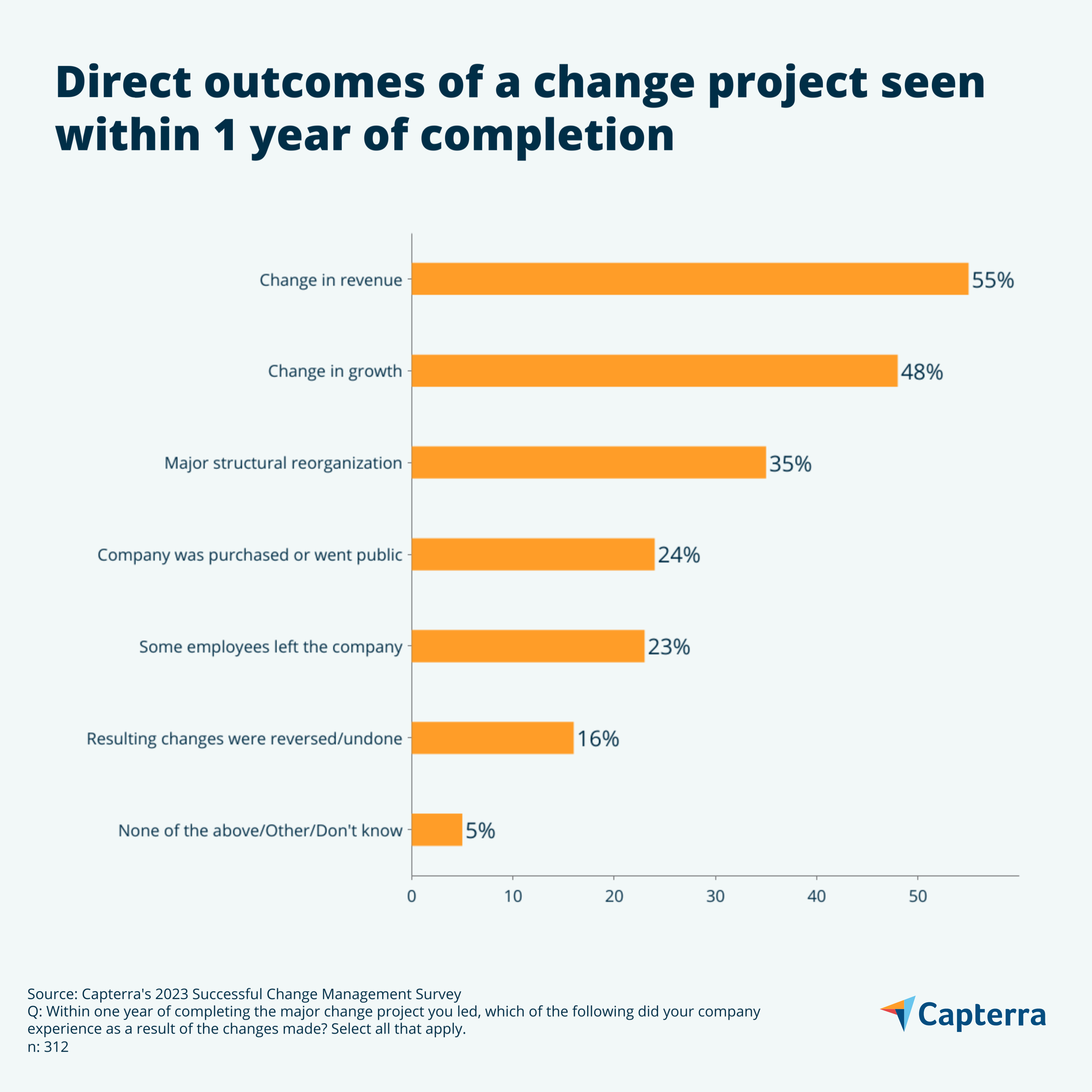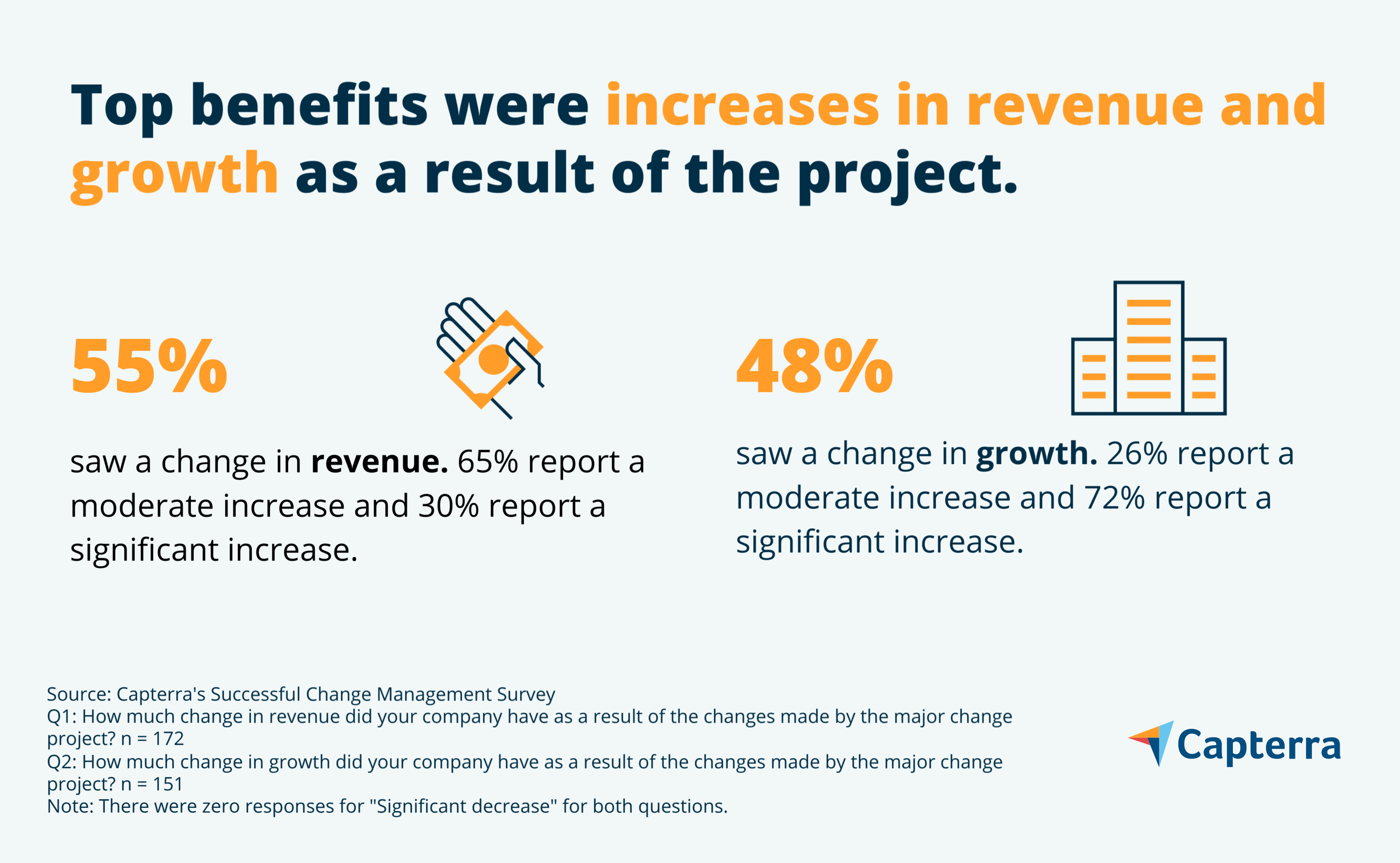Nearly half of SMBs didn’t have a PM lead their latest change effort.
Businesses are constantly faced with the challenge of keeping up with technological advancements and ever-changing business needs and goals. To implement major changes, businesses typically take a project approach. Major change projects are intentional initiatives that have substantial benefits and allow a company to grow, change, and adapt in an effective way.
For small businesses with limited resources, major change projects can seem daunting and there’s often a strong temptation to not fully staff the project.
But the effective way to lead change projects in your business is to start by having a dedicated project manager and a change management specialist focused on the initiative from the start.
To learn more about this, we conducted the Successful Change Management survey* of 312 project managers at SMBs to learn how they used major change projects to their advantage.
96% of these surveyed businesses report their last major change project was successful and over half saw an increase in revenue after completing the project. So it’s clear that major change projects are an effective way to drive innovation and digital transformation, leading to increased efficiency, productivity, and profitability.
/ Key findings
Taking a project approach results in successful changes: 96% of surveyed project managers at SMBs report their last major change project was successful, 65% even say fully successful.
Employees see the need for faster changes: 54% of SMB PMs agree that the current pace of transformation via major change projects at their company is too slow.
Change projects drive company performance: Majority of SMBs that ran change projects saw moderate to significant increases in revenue and growth.
But, the project isn't always given the resources needed to be successful: In fact, 43% of SMBs have performed a major change project without a project manager and nearly half (47%) had a PM only part-time or unofficially assigned.
Major change projects are too complex for a PM to go at it alone: 54% of SMBs have performed major change projects without a change management specialist, primarily due to budget constraints or the PM was assigned those tasks.
Is this report not quite the project change management you’re looking for?
If you’re wanting to learn about what to do when changes are requested within an existing project, check out Change Management: The Key to Smooth Project Transitions. You’ll learn tips on how to manage changes to the scope, timeline, and/or budget of your project.
Majority of SMBs see increase in revenue after a change
Major change projects offer an opportunity for SMBs to incorporate innovation and digital transformation into their operations. By implementing new technologies or expanding into new verticals, businesses can increase revenue and growth, prepare for a buyout or IPO, or implement a major structural reorganization to optimize resources and allocations.

While most of these are positive outcomes, 16% of SMB PMs report that the changes made as a result of their project were undone or reversed within one year. This isn’t always a bad choice—it could even be a necessary one. But the more planning and resources you provide the project’s PM, the more you can reduce this risk in the first place.
Now let’s take a closer look at the most common outcomes of major change projects: more growth and revenue.

As a business, you can choose to ignore the need for change and try to ride out the consequences, fumble through the changes without a plan of action, or take a measured approach with a formal project plan. We strongly recommend against the first two. Instead, we’ll provide insight and guidance on how to empower the project manager to lead a major change project to see maximum benefits.
Why does a PM need a change management specialist to succeed?
Major change projects are initiatives that bring significant change to a business, such as implementing a new technology or starting a new business vertical. While these projects can be difficult to manage, they offer numerous benefits to SMBs and should be given the proper resources to be successful.
Specifically, we recommend assigning a project manager and a change management specialist. Let’s take a closer look at each of these roles.
59% of PMs say they could’ve been more effective in their last major change project had they been involved earlier in the process. It’s important to include at least the PM in the initial conversations about the changes needed.
Change management specialists focus on the people
A change management specialist focuses on managing the people aspects of change, ensuring that impacted employees are informed, engaged, and prepared for the changes that will happen. This person socializes the initiative with key stakeholders, building support from all employees impacted by the change, focusing specifically on the skeptics and those resisting change.
41% of respondents say that their last major change project could have been more effective if they had more stakeholder trust. The change management specialist can greatly reduce any skepticism and garner support for the project with key stakeholders.
Project managers focus on the processes
A project manager is responsible for planning, executing, and closing the project, ensuring that it is completed on time, within budget, and according to specifications. They use tools such as root-cause and SWOT analysis, create a DACI matrix, and Gantt charts to manage the project effectively. The PM’s attention should be focused on leading the project team and managing the scope and budget.
Together, the PM and change management specialist roles ensure that the project is successful and that the impact on employees is minimized.
56% of PMs say it’s their responsibility to lead the change management activities. But this splits their focus too much and both the project work and employee adoption to the change suffer as a result. Assigning a change management specialist, even if only part time, can greatly improve the chance of success for the major changes needed.
43% of SMBs didn’t have a full-time PM leading the major change project
Fifty-four percent didn’t assign a change management specialist. Assigning a project manager and a change management specialist is critical to the success of major change projects. But just assigning anyone to a project won’t equate to a successful adoption of the changes that result from the project work.
Tips for success:
Choose the right people for the job. When selecting a project manager and change management specialist, look for people with experience in managing similar projects and a track record of success. Additionally, consider their communication and leadership skills, as these are essential for managing change.
Foster collaboration. Encourage collaboration between the project manager and change management specialist. These roles should work closely together to ensure that the project is managed effectively and that the impact on employees is minimized.
Provide adequate resources. Major change projects require resources, including time, money, and personnel. Ensure that the project has the necessary resources to be successful, and be willing to make adjustments as needed.
65% of PMs say having more skilled or experienced resources would’ve increased their effectiveness in leading their last project. Be sure your project team has the resources needed to be effective at the work you’re asking them to do.
Proper project resourcing drives growth and profitability
It’s critical to give the PM the resources and time they need so vital activities aren’t skipped.
For example, only 54% of PMs report completing a risk assessment for their last major change project. When the PM is overloaded with all change management tasks and their own project management ones, important steps like this one are often overlooked. Not having a risk assessment often results in undesirable outcomes, missing requirements, and can even result in the project goals not addressing the business problem.
Major change projects offer SMBs the framework to drive transformation, prepare for a buyout/IPO, and increase growth and revenue. By properly resourcing the project with a project manager and a change management specialist, SMBs can successfully navigate these projects. While major change projects can be challenging, the benefits are numerous, and with a measured approach, SMBs can thrive in today's rapidly changing business landscape.
54% of PMs say having more decision-making authority would’ve helped them be more effective.
If you’d like to become more influential in decision-making, check out From Task Manager to Strategic Partner: How Project Managers Can Become More Influential.
